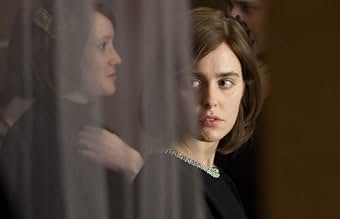IMDb RATING
6.7/10
1.7K
YOUR RATING
In Félix and Meira, an unusual romance blossoms between two lost souls who inhabit the same neighborhood but vastly different worlds.In Félix and Meira, an unusual romance blossoms between two lost souls who inhabit the same neighborhood but vastly different worlds.In Félix and Meira, an unusual romance blossoms between two lost souls who inhabit the same neighborhood but vastly different worlds.
- Director
- Writers
- Stars
- Awards
- 15 wins & 14 nominations total
- Director
- Writers
- All cast & crew
- Production, box office & more at IMDbPro
Featured reviews
Felix and Meria begins with a traditional Hasidic Jewish dinner: singing, celebration and religious clothing. Everyone seems comfortable except for Meria, our protagonist, and immediately through visuals we sense that something does not sit well with her. Thus begins the major conflict of the film as Meria debates internally her commitment to tradition.
Because of the timeless nature of this culture, at the beginning it is deliberately unclear what time period the film takes place in. Meria is scolded by her extremely traditional husband for playing LP records, indicating the film is a period piece. Yet as the film goes on and Meria slowly ventures outside of her Hasidic bubble, we realize that the film does in fact take place in present day, yet we discover it through her eyes and slowly it becomes more modern. The visual palette (like a love child of last year's Ida and A Most Violent Year) distinctly drives Meria's journey. This makes the modern world look in a distinct way unlike anything I have ever seen in a movie.
While focusing on Meria and her doubts in her beliefs, it quick develops into a love story. Despite being married and living among the traditional culture, Meria falls for Felix, a bachelor without the same family values. This isn't the adulterous kind of romance - everything is subdued, making even holding hands feel like a display of passion. The suspense remains because of how forbidden the relationship is in the first place, and thanks to top-tier performances and direction, the relationship between protagonists never feels inauthentic.
The dramatic sequences scattered throughout the film significantly outweigh the overall narrative. The symbols are rich without being overt. As said above, this is a movie full of subtlety that matches the emotional tone of the characters. The only not subtle moment happens right after Felix and Meria first spend time together, when the film transitions to an isolated clip seemingly unrelated yet emotionally moving. I would have been happy to see more of these, but alas because it only happened once it draws more power to itself.
As stated above the primary conflict of the film is tradition vs. love, which is incredibly powerful yet not as universal in today's world. Unfortunately, Meria's husband is reduced to being a caricature and not given enough complexity as a character. Had he been more layered, it would increase the stakes in how difficult it would be for Meria to decide to stray away from him. Regardless, this is the romantic drama that people should yearn for. Most romance audience prefer the more saccharine Nicholas Sparks adaptations, but could truly enjoy seeing something much more subtle and powerful as seen in Felix and Meria.
Because of the timeless nature of this culture, at the beginning it is deliberately unclear what time period the film takes place in. Meria is scolded by her extremely traditional husband for playing LP records, indicating the film is a period piece. Yet as the film goes on and Meria slowly ventures outside of her Hasidic bubble, we realize that the film does in fact take place in present day, yet we discover it through her eyes and slowly it becomes more modern. The visual palette (like a love child of last year's Ida and A Most Violent Year) distinctly drives Meria's journey. This makes the modern world look in a distinct way unlike anything I have ever seen in a movie.
While focusing on Meria and her doubts in her beliefs, it quick develops into a love story. Despite being married and living among the traditional culture, Meria falls for Felix, a bachelor without the same family values. This isn't the adulterous kind of romance - everything is subdued, making even holding hands feel like a display of passion. The suspense remains because of how forbidden the relationship is in the first place, and thanks to top-tier performances and direction, the relationship between protagonists never feels inauthentic.
The dramatic sequences scattered throughout the film significantly outweigh the overall narrative. The symbols are rich without being overt. As said above, this is a movie full of subtlety that matches the emotional tone of the characters. The only not subtle moment happens right after Felix and Meria first spend time together, when the film transitions to an isolated clip seemingly unrelated yet emotionally moving. I would have been happy to see more of these, but alas because it only happened once it draws more power to itself.
As stated above the primary conflict of the film is tradition vs. love, which is incredibly powerful yet not as universal in today's world. Unfortunately, Meria's husband is reduced to being a caricature and not given enough complexity as a character. Had he been more layered, it would increase the stakes in how difficult it would be for Meria to decide to stray away from him. Regardless, this is the romantic drama that people should yearn for. Most romance audience prefer the more saccharine Nicholas Sparks adaptations, but could truly enjoy seeing something much more subtle and powerful as seen in Felix and Meria.
The story makes sense and is slowly unraveling in a way for us to gather the feelings. A bit like real life can be slow. Real life slow feels less slow than films though. But the films goes its way and we finally arrive somewhere slow and boring but a notch more free. Praise the lord!
This film is about the explicit values of two adjacent cultures who live on different sides of a railroad, each reaching for something more
the unknown. For Felix and Meira, the unknown becomes uncertainty. Life and lifestyles are disrupted, communities clash, and traditions unsaddled.
This isn't a story of skinheads, hippies, Trekkies, or of Generations X, Y, or Zeds. It is of a girl called Meira and French Felix, each who adopt their known cultural traits. Her identity is repressed, arrested by secret Hasidic customs and protocol where women are quieted and obedient. Apparently of the Satmar tribe, women wear wigs and are in arranged marriages. Felix flits in and out of his family, daring to explore the matrix of love. Meira too openly resists the known in favour of love, romantic love. However, romantic love is not reality.
Viewers experience subconscious moments acknowledging resistance to our ostensibly defined lives. Each of us wanting to explore outside known cultural norms. Some may call it slow moving, I call it pace. We aren't rushed through every scene, but given permission to decode the mysteries of the Hasidim. What is uncovered, I cannot tell. What is revealed, is how the unknown can be even more uncertain than what we know.
This isn't a story of skinheads, hippies, Trekkies, or of Generations X, Y, or Zeds. It is of a girl called Meira and French Felix, each who adopt their known cultural traits. Her identity is repressed, arrested by secret Hasidic customs and protocol where women are quieted and obedient. Apparently of the Satmar tribe, women wear wigs and are in arranged marriages. Felix flits in and out of his family, daring to explore the matrix of love. Meira too openly resists the known in favour of love, romantic love. However, romantic love is not reality.
Viewers experience subconscious moments acknowledging resistance to our ostensibly defined lives. Each of us wanting to explore outside known cultural norms. Some may call it slow moving, I call it pace. We aren't rushed through every scene, but given permission to decode the mysteries of the Hasidim. What is uncovered, I cannot tell. What is revealed, is how the unknown can be even more uncertain than what we know.
Maxime Giroux's 'Felix and Meira' tone is set from the very first frame, captured in black and white. Malka or Meira plays with her soup with a soup spoon, a Shabbos meal. Her husband with finely curled ear locks, wearing a black hat trimmed in sable, and wearing a long black silk coat celebrates the Sabbath with gusto, in song and food and the pouring of wine. Meira feels estranged from this world of ultra Orthodox Jews, living in Montreal. A community that keeps very much to itself; insulated religiously in a world of Yiddish and Hebrew, prayers and rituals. A world in which husband and wife sleep in separate beds, according to tradition; coitus takes place only during days of ovulation; menstruation renders her impure, a ritual bath cleanses her. Malka wears a wig, long garments, She has but one duty to bear her husband many children. She doesn't; after the birth of her daughter she takes up pen and notebook to draw; she has a certain talent. She likes music which her husband forbids. She's listless and wanders aimlessly in her mind. In secret, she takes birth control tablets, for she doesn't want more children. And into her universe comes a secular man, an artist of sorts, a lost soul who feels empty because a strict father has never shown him love or interest since he didn't follow in the man's footsteps, it's inferred. So Felix travels and is now back in his own flat in Montreal, perhaps in Westmount, a Jewish enclave of Anglophone Jews. And as the narrative develops these two souls collide and a desperate, quite love arises between them. Too, late Meira's husband declares his love for her, but she is beyond his pleas for she has left an tradition from which she cut herself off and can never return. (Woody Allen treats the theme but without tragedy in 'Fading Gigolo', and Boaz Yakin treated seriously in the 1998 film 'A Price Above Rubies', with more or less the same outcome as Giroux's film.) The closing scenes are shot in Venice, on a grey day. A in an aside, Meira wishes regrets she has taken her daughter out of structured community, for life with her and Felix. Felix stolidly stares into the mournful cast of Venetian light. The pairing will never be happy, but, it is suggested, that in desperation they will cling to each other.
10ageyagey
It is always good to be able to define yourself. Even if traditions contradict your mind. In this film I saw the case when traditions are evil that rules over weak people. ....and love is not a tradition, it is a decision, not possible without knowing yourself. I like enormously the film, three main actors played excellent. What impressed me a lot were two sequences: the first one - the conversation between а "tradition man" Luzer Twersky and а "non tradition man" Martin Dubreuil; and the second one - when a "tradition man" broke his tradition listening to the song "After Laughter "after his wife left him.
Did you know
- TriviaLuzer Twersky and Melissa Weisz, who play Shulem, the husband, and Ruth, the friend Meira confides in about not wanting to have more children, both are former Hasidic Jews who left the community as young adults. Twersky assisted in translating the script into Yiddish and served as a technical adviser regarding pronunciation, costumes, meals, and the Jewish rituals depicted in the movie.
- GoofsWhen Shulem hits Félix, you can see Meira in the background trying not to giggle. Considering the tensity of the scene and the nature of Meira's character, it's very likely this was unintentional and a break in character.
- ConnectionsFeatured in 2016 Canadian Screen Awards (2016)
Details
- Release date
- Country of origin
- Official site
- Languages
- Also known as
- Felix and Meira
- Filming locations
- Production companies
- See more company credits at IMDbPro
Box office
- Gross US & Canada
- $447,353
- Opening weekend US & Canada
- $15,000
- Apr 19, 2015
- Gross worldwide
- $496,714
- Runtime1 hour 45 minutes
- Color
- Sound mix
- Aspect ratio
- 2.35 : 1
Contribute to this page
Suggest an edit or add missing content






























